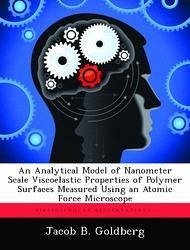The United States Air Force and the Department of Defense is increasingly interested in nanomaterials. To study these materials, one needs to measure the mechanics of materials on the nanoscale. Over the past few decades the atomic force microscope (AFM) has been used in various methods to establish local surface properties at the nanoscale. In particular, surface elasticity measurements are crucial to understanding nanoscale surface properties. Problems arise, however, when measuring soft surfaces such as polymers and biological specimens, because these materials have a more complex viscoelastic response. This research focuses on modeling an AFM dynamic nanoindentation experiment intended to characterize near-surface viscoelastic material parameters. The experiment uses an AFM in dynamic contact mode with a polymer surface to gather frequency dependent amplitude and phase data. A three-dimensional, dynamic viscoelastic model of the AFM and surface interaction is developed and then analytically solved in the linear approximation under appropriate physical assumptions based on the physics of the AFM experimental setup. As an illustrative application, the analytical solution is coupled with experimental data from a polystyrene material to ascertain surface material properties at the nanoscale. Our solution allows the direct calculation of the storage and loss modulus from experimental data.
Hinweis: Dieser Artikel kann nur an eine deutsche Lieferadresse ausgeliefert werden.
Hinweis: Dieser Artikel kann nur an eine deutsche Lieferadresse ausgeliefert werden.








